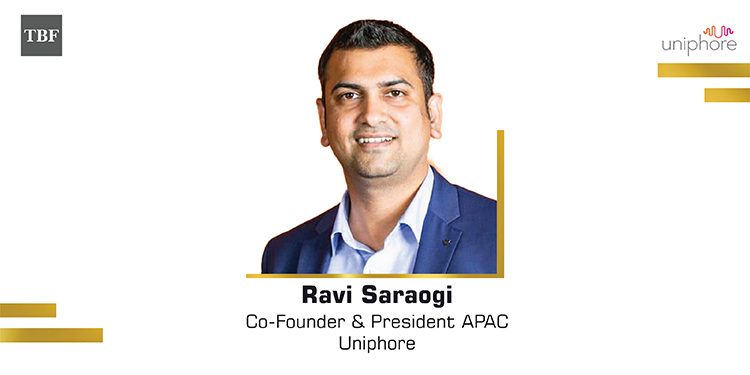The 2nd Edition of the VoiceTech Summit Middle East 2021 brought together industry professionals, key stakeholders, and senior executives keen to discover the potential of Conversational AI and Voice Technology for greater customer experience (CX) and interactions.
Uniphore, the event’s main partner and a global leader in Conversational AI, showcased their range of solutions for contact centers, which earned them a visible spotlight. Uniphore is disrupting an outdated customer service model and bridging the gap between humans and machines by focusing on conversations.
Here is a fireside chat by Ravi Saraogi, Co-Founder and President of APAC, Uniphore, with Abid Mustafa, Director of Strategy and Customer Experience PMO, Etisalat. Chris Mackintosh, COO, CCU Global, a seasoned call centre veteran, moderated the session.
Given Uniphore’s rapid expansion, in what CA (Conversational Automation) services do you see most room for growth?
Ravi: Over the years, call centres have been prevalent, and a lot of investments have gone into converting them to contact centres over time by moving from analogue signals to digital (emails, chats, social media, etc.). But what has been left behind is the actual front-office where conversations happen between agents and customers. In today’s era, what trumps in terms of customer retention and acquisition of new customers is how brands deliver the overall experience, and that’s where most room for growth exists, in my opinion.
What impact has conversational AI had on customer service across the MENA region? How open are MENA consumers to Virtual Assistants being used?
Abid: In 2018, an IDC report cited that the size of the AI market within the Middle East was worth around 260 million USD, and by 2023 they projected it to grow to about 600 million USD. The driver behind this was customer satisfaction and CX.This means conversational AI has a huge role to play in satisfying customers and improving the overall experience.
A PWC report cited that by 2030 the AI contribution to the UAE market’s GDP will be $96 billion and Saudi Arabia $124 billion. These numbers indicate that there is a huge growth opportunity for AI in this part of the world.
Chatbot and Virtual assistants are currently employed within call centres across different industries, or as Ravi mentioned, contact centres have multiple channels, and the reason for that is, of course, that call centres are costly to run. They’re under constant pressure to reduce costs and increase efficiency. I don’t see fewer chatbots and virtual agents; I see more chatbots and more virtual agents proliferating in the Middle Eastern market. I also see, perhaps on the horizon, “Virtual Reality Augmentation”, meaning that rather than having a chatbot or a voice assistant, we’ll probably have Avatars that would mimic agents’ personalities to interact with customers.
Aside from CX, where else do you see AI having the most value as far as enhancing a business goes?
Abid: There is this notion that AI is a temporary phenomenon – it’s a passing phase, and it will fizzle out; I think this is a wrong impression. AI is here to stay, and the present decade is going to be the decade of AI. AI has become culturally invisible-if you look at your smartphone, you’ve got AI working in the background. All of this is a game-changer.
There’s a whole range of use cases about to be discovered, and businesses that have three things will succeed: Access to data. Sophisticated AI algorithms and the ability to think outside of the box and generate use cases. Companies will need to partner and collaborate with other businesses to deliver services in the next few years.
To what extent did COVID increase demand for CA services?
Ravi: As the world went into lockdown, we were forced to WFH. The number of available agent representatives for enterprises diminished by a staggering 23% to 24%. WFH for agents became necessary, and companies began supporting WFH agents through technologies like CA, which became an important factor. We also observed among our global and cross-industry customers that, due to pressures on sales, balance sheets, and thus profitability and EBITDA margins, enterprises were compelled to focus on productivity gains and cost cutting.
If organisations cut costs where needed, they can still manage profitability. The most significant chunk of resources enabled by large enterprises was in the contact centre, and that was the first area of digital transformation. Real-time analytics and after-call-work automation powered by AI have played a significant role in the front-office enablement of RPA.
Organizations planning their digital transformation journey as a long-term, phased approach were plunged into this shift overnight, which has undoubtedly benefited them. This transformed the overall industry.
Uniphore acquired two companies in 2021 – Emotion Research Lab and Jacada. What are the roles of these companies in Uniphore’s growth story?
Ravi: John Chambers, who’s Uniphore’s investor and board member, has seen a lot of ups and downs in his career of building Cisco from a $50 million to a $50 billion enterprise. John always said, “When there is a downturn in the market, and if you stick to your culture and aggressive goals, and come out of that, you will have an opportunity to become the leader in that market.”This advice got us to figure out how to differentiate ourselves and continue growing during the pandemic when there was an absolute downturn across the globe.
Uniphore was focused on building our CA platform with capabilities around voice and AI coming together. With video AI, we found that there are enough opportunities and use cases for us to focus on and bring a combination of voice and video AI together, which can be highly transformative in how the world is progressing. The acquisition of Emotion Research Lab in January 2021 came into being through that thought process, which is now enabled into our CAplatform – we will soon launch the beta version of our product capability around video.
With Jacada, the idea is to go into motion to enable the entire platform with low code and no code to allow our customers and partners to executeuse cases that they wish to without having too much technical knowledge of the platform but having industry experience. We completed the acquisition of Jacada on 21st October 2021 and unveiled the industry’s most comprehensive Conversational Automationplatform that will further enable enterprises to transform customer experiences.
Headquarter In: Chennai
Founded in Year: 2008









